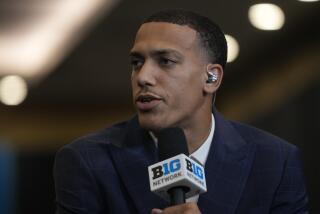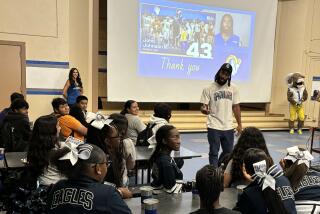THE TURNAROUND : Roger Johnson Rebounds From Problems Father’s Death Caused
- Share via
SAN DIEGO — Before every Lincoln High School basketball game, Roger Johnson goes off in a corner by himself. He sits and thinks about the upcoming game. Then he takes out the bracelet his father, Roger Sr., used to wear and rubs it.
“I take it and say, ‘Give me luck, help me now because I know you would help me if you were here,’ ” Johnson says to the father who cannot hear him.
Roger Sr. died of cancer when Johnson was 12.
It is always painful to lose a father, but it was especially hard on Johnson. His coaches and school counselors say that was when Johnson started going downhill, when he isolated himself, when he turned irresponsible. Johnson agrees.
“When he died, there was nothing left for me. He was all I had,” Johnson said. “After that, the problems started.”
Jose Hall, a Lincoln assistant coach, said Johnson refused to talk about his father immediately after his death. Rubbing the bracelet appears to be a measure of how far Johnson has come since then. Maybe it’s a sign that he can use the things his father taught him in a positive way and not let the hurt caused by his loss get in the way of success.
Whatever the reason, Johnson is on his way to success. Everybody around him has been shocked by his growth this year, especially academically. Johnson said he has even surprised himself.
Johnson, a 6-foot 6-inch, 180-pound senior forward, sees that change directly reflected in his improvement on the court. He has become one of the best players on a Lincoln team that won the Southern California Division III title last Saturday and will play Daly City, the Northern California champion, for the state championship Saturday at 12:45 p.m.
At times, Johnson is capable of taking over and dominating a game. Johnson said he never thought that was possible two years ago.
“I didn’t even think about basketball then. I didn’t think about anything,” he said. “Back then, I was into girls. I never went to class. I liked to think I was bad.
“But now I see there is so much to care about--my family, my coaches, my teammates, myself. I see I’m in a position where I can go somewhere. I know I have to work hard to achieve what I want.
“My coaches stuck by me when things were going bad. I didn’t realize it at first, but they took over for my father. I just thank God that they were there for me. I don’t know where I’d be right now if it weren’t for them.”
Ron Loneski, who has coached Johnson for three years at Lincoln, said, “I think Roger has finally become a man.”
Hall, who had known Johnson since he was in fourth grade, said his first memory is that of a tall, skinny kid clinging to his father’s hand and trying to hide behind one of his legs when they walked into the gym where Hall ran a youth basketball league.
“I was scared,” Johnson said. “I knew I could play well because I had beaten two of my friends by myself one time. But I was scared to play in a league.”
His father cured that. Johnson had learned to play by shooting a basketball for hours every day through the rungs of a ladder that hung over a rafter in the garage. But when his father bought him a real hoop, he blossomed.
He’d stand out in the driveway shooting until 11 at night sometimes, Johnson said. Sometimes, he and his day would play one-on-one.
“He used to let me win, too, just to keep me happy,” Johnson said. “I guess I thought I was something back then.
“We did everything together. We were buddies, partners to the end.”
Suddenly, all that was gone. Things changed.
Johnson went back to live with his mother, Shirley. His parents were separated, but Johnson had gotten along well with his mother.
But even she couldn’t get through to him, Johnson said. “Every time she would try to talk to me, we’d get in a fight.”
He was in and out of junior high schools. “I can’t count how many I tried,” Johnson said. “I couldn’t deal with the other students. I’d snap at them if they’d say anything to me at all.”
Finally, he resorted to basketball. He’d find a park with a hoop and shoot for hours, especially during his ninth-grade year.
“I’d shoot even if they turned the lights out on me,” Johnson said. “That was about the time I learned how to dunk. I’d dunk and dunk just to get rid of the anger I had.”
It was about that time when Johnson ran into Hall on a bus. He recognized Hall and talked to him about playing on the Lincoln freshman team that Hall coached.
Hall said Johnson was a star on that team, which also featured most of the players who play for Lincoln now.
“He had good outside touch,” Hall said. “He was an excellent shot blocker and rebounder even though he was so skinny.”
Off the court, things were different. Johnson earned only four credits and flunked most of his classes.
“You could see that his dad’s death hit him hard,” Hall said. “I think a lot of his problems with life were because of that.”
His talent was enough, though, to earn a spot on the varsity team the next season. He was a part-time starter and Loneski said he showed real potential.
But when playoff time rolled around, Johnson was academically ineligible. The same thing happened his junior year.
Elva Mora, a counselor at the school, had worked with Johnson from the time he enrolled at Lincoln. She met with him all the time to try to coax him to become a better student, but even she couldn’t keep him eligible.
“When things wouldn’t go his way, he’d just walk off,” Mora said. “He had a 1.58 grade-point average and had minimal chance of graduating. It was like he felt, ‘You--the system, you--the society are doing this to me.’ He thought everything was ‘Them vs. Me’ ”
Johnson remembers exactly when that began to change.
He had thought about trying to turn his life around during the summer, but it wasn’t until he was sitting in the detention center for cutting class early last fall that he finally decided to do something.
While he was sitting there, Mora made him write a letter to herself and Loneski, telling about what he had accomplished in his three years at Lincoln. Johnson resisted at first, like he did with everything Mora made him do. But as he started writing the letter . . .
“It started to come to me,” he said. “I began to realize that everyone had just been trying to help me. She didn’t think I had it in me. I guess I surprised her. We get along great now.”
Johnson began to surprise everyone with his classroom performance. He had a 3.0 grade-point average and was on the honor roll last fall. He finished the semester with a 2.42, nearly an entire grade point better than his cumulative.
Graduation, which before was a long shot at best, became Johnson’s biggest goal. He said that after the season ends he plans to take evening classes at the Educational and Cultural Complex, a part of the San Diego Community College system, to earn enough credits to graduate with his class.
Johnson said its a lot easier to concentrate on playing basketball when you are not worried that the coach might find out that you missed a class or got an F on your last test.
“I used to walk with my head down all the time,” Johnson said. “I don’t do that anymore. I’m more relaxed on the court because I know I went to class.”
Johnson’s numbers reflect that confidence. He has averaged 13.8 points, 11.7 rebounds and 3.1 blocked shots. He has scored in double figures in 25 of Lincoln’s 28 games.
Loneski has watched Johnson mature. There were times, Loneski said, when his friends had told him to wash his hands of Johnson. But Johnson has made him glad he didn’t listen.
“I used to get on Roger because of the way he dressed,” Loneski said. “He’d come to school with his pants pulled down and he looked like a bum. You look at him now, and he wears sweaters and dresses really nice. If I had given up on Roger, he would be in the streets right now. He would have never stayed (in school).”
But Loneski realizes, as does Johnson, that it hasn’t been easy. He also knows that Roger Johnson Jr. might never have been in trouble had Roger Johnson Sr. been there all along.
“I’ve really seen a lot more maturity within him this season,” Loneski said. “But I really believe that if his dad had been alive and given him that fatherly guidance, he would be an unbelievable player right now.”
More to Read
Get our high school sports newsletter
Prep Rally is devoted to the SoCal high school sports experience, bringing you scores, stories and a behind-the-scenes look at what makes prep sports so popular.
You may occasionally receive promotional content from the Los Angeles Times.






